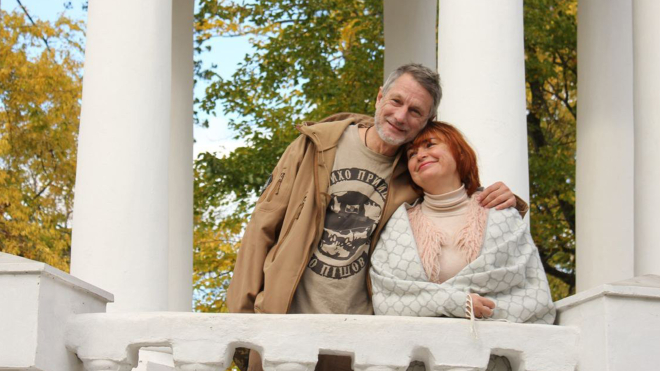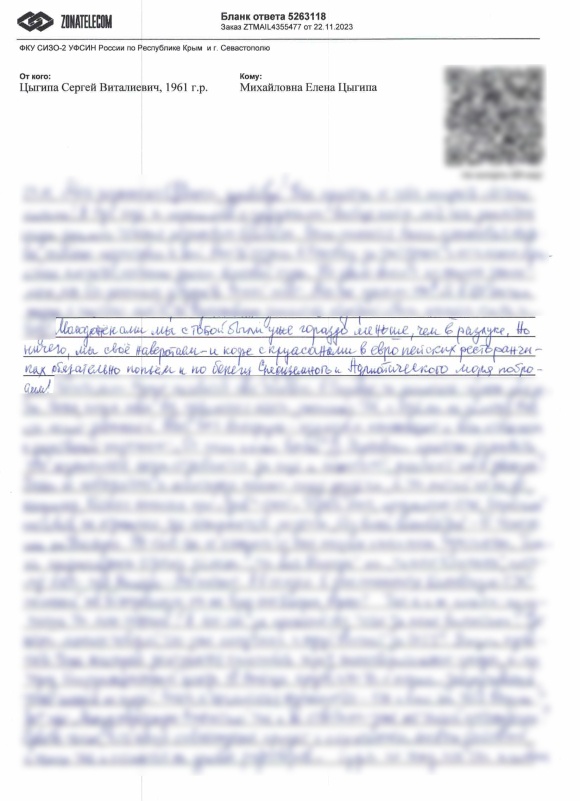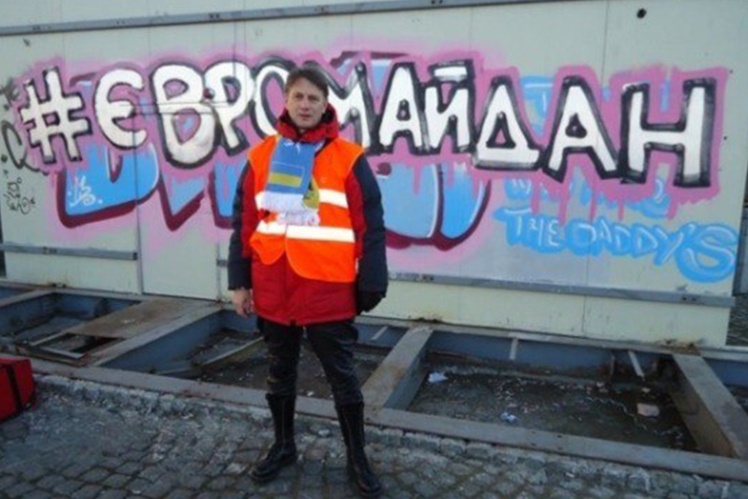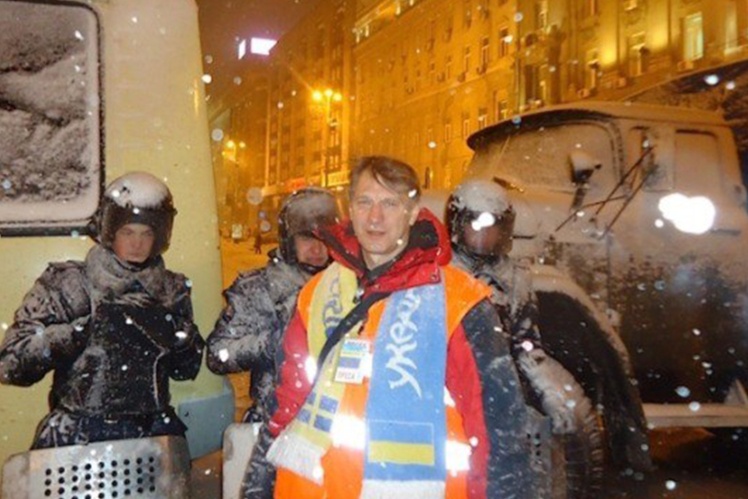1.
Olena met Serhiy in the 1990s. She was an actress and together with the youth theater Chance toured Ukraine with concert programs. Serhiy helped her with the tours organization — for example, arranged for transport. Both Serhiy and Olena had their own families at the time, so they later lost contact.
According to Olena, Serhiy was always charismatic and knew how to convince people. Back in Soviet times, he organized the Tavria Rock and Roll festival.
“Serhiy always held managerial positions. He was a very active and energetic person,” Olena says and quickly corrects herself. “And still is.”
Olena and Serhiy started talking again in 2015, when they met by chance through a mutual acquaintance. By that time, both had already broken up with their spouses. Soon after that they started dating. Serhiy served in the Ukrainian Armed Forces and came to Olena in Nova Kakhovka on vacation. When he was sick, Olena came to see him in the hospital.
In 2017, Serhiy was dismissed from service due to health issues. At first, he worked as a PR manager in Dnipro, and when the coronavirus pandemic began, he moved to Olena in Nova Kakhovka.
"In 2021, we got married. We combined Serhiyʼs jubilee and our wedding into one loud holiday," Olena recalls. “In one of the letters from the pre-trial detention center, Serhiy once wrote that we have been separated for longer than we have been officially married.
"You and I were newlyweds for a much shorter time than when we were separated. But itʼs okay, weʼll make up for it — and weʼll definitely drink coffee with croissants in European restaurants, walk along the shores of the Mediterranean and Adriatic seas!"
Особистий архів Олени Цигіпи / «Бабель»
2.
After the full-scale Russian invasion started on February 24, 2022, the couple didnʼt plan to leave the city: they believed that the occupation of Nova Kakhovka would last no longer than two weeks. While waiting for its liberation, Serhiy began to write about events in the city and region on his Facebook page.
“Readers sent him videos and information [about the occupiers], and he at his discretion published it or sent it to the Ukrainian army. I fell asleep — he was still working, I woke up — he was already working. He seemed to feel that something was going to happen to him, and he was in a hurry to live,” says Olena.
Friends turned to Tsyhipa with requests, for example, to take care of their elderly relatives. In the morning, Serhiy and Olena stood in lines for medicines and food, and in the evening they delivered them to their addresses. Later, family volunteering grew into the "Ukrainochka" initiative. They received requests through Serhiyʼs page, collected money and looked for where to buy the necessary goods.
On March 6, 2022, residents of Nova Kakhovka held a rally against the Russian occupiers. Serhiy made a speech and thanked everyone who came. After the rally, he received several warnings from acquaintances that the Russians were following him.
Rally in Nova Kakhovka on March 6, 2022.
Особистий архів Олени Цигіпи / «Бабель»
“For some time he hid in the place of one our friends, then with others. He did not spend the night twice at the same address,” Olena recalls. “But later he stopped hiding. Perhaps he understood that he would be searched for at his familyʼs addresses, [and the occupiers] would frighten everyone and turn everything upside down.”
The Russians had many reasons to follow Tsyhipa. He is a retired major of the Ukrainian Armed Forces. Since 1987, he served in the KGB of the USSR, and later in the Security Service of Ukraine. He worked in the tax police, was elected as a deputy of the Nova Kakhovka city council three times, and worked as a journalist. He was an active participant in two Ukrainian revolutions — on 2004 and 2013-14. In 2015, he joined the Ukrainian army as a volunteer, served in the 8th Separate Special Forces Regiment.
Serhiy Tsyhipa at the Euromaidan in Kyiv, 2013-14.
Особистий архів Олени Цигіпи / «Бабель»
Olena doesnʼt know why the Russians did not capture Serhiy immediately. He did not hide his face, was constantly in the city. She assumes that the occupation authorities were waiting for an order "from above".
On the morning of March 12, 2022, Serhiy walked from Nova Kakhovka to Tavriysk city. He was supposed to visit Olenaʼs mother and meet with his acquaintance. Serhiy wanted to write about him in his blog — about how the Russian military took his car at a checkpoint, plastered it with the "Z" symbols and drove until it ran out of gas.
In Tavriysk, Serhiy planned another meeting, which he did not tell Olena about: he wanted to meet with journalist Oleh Baturyn and discuss something face-to-face. On that day, Oleh was also kidnapped by the Russian military.
“Some time passed, my mother called and said: "Serhiy is gone. Iʼm worried". I didnʼt voice my worries to anyone, I thought they would beat him so that he would shut up and stop posting online, and then let him go,” Olena recalls. “But when I saw the publication of Oleh Baturynʼs wife [about the arrest of her husband], I understood that two journalists with an active Ukrainian position were kidnapped, and this will not go away that easily.”
Oleh was released on March 20, 2022. Together with his family, he left for the Ukraine-controlled territory. Two years later, Baturyn remembers how he and Serhiy were kidnapped by the Russian military.
Oleh Baturyn.
On the twelfth of March 2022, at approximately 12:00 p.m., Serhiy called Oleh and offered to meet somewhere between Kakhovka, where Baturyn lived, and Nova Kakhovka, for example, in Tavriysk. He didnʼt go into details, he only said that it was necessary to see each other. Baturyn refused — it was dangerous to go outside the city. A few hours later Serhiy called again. He said that he found an opportunity to get to Kakhovka. The men agreed to meet at 5 pm at the bus station. At the meeting place, Oleh saw only a white minivan. He looked around at the people in the front seats — Serhiy was not among them. The militias from the Russian Guard (Rosgvardia) jumped out of the car and dragged Oleh into the salon.
Baturyn suspects that Tsyhipa offered to meet not of his own free will. He did not call from the number he used to call usually. But Oleh thought that Serhiy was trying to avoid eavesdropping, and did not suspect anything. Around 5:00 p.m., Oleh received another call from this number, and immediately after that he was captured by the Russians. Presumably, in this way they checked that it was Baturyn who came to the meeting.
On March 13, Oleh was taken to Kherson together with other abductees. The blindfolded detainees were taken to one of the offices of the Kherson Regional State Administration and asked them to name themselves. Tsyhipa also called himself, Oleh recognized his voice. Baturyn was left in the cabinet, all the others were taken to neighboring rooms. Olehʼs interrogation lasted for about six hours — the Russians asked for the addresses and phone numbers of activists, rally organizers, and anti-terrorists, and then took him to a cell. Oleh did not hear anything more about Serhiy.
Every day more people were kidnapped. The Russians beat them with their feet and rifle butts, simulated executions. Medical aid was not provided — in the cell next to Oleh, a citizen of the Netherlands was kept, who had a fever, probably due to pneumonia. Baturyn assumes that he died in the cell.
“It was scary, Iʼve only seen it in films about Germans. They [the Russians] beat people, mocked them. They flew into the cells of the soldiers and began to beat their heads against the walls. The screams were terrible,” Oleh recalls.
Oleh assumes that Serhiy was not set free because of his service — among the captured, occupiers were the most interested in military personnel, even former ones.
“If they understood that I was already detained in Crimea in 2014, that I am one of the key investigators in the ʼMH17 caseʼ, then they simply would not have let me go,” Oleh explains. “They were already looking for me after I left the occupation.”
"I have already won this war. The main thing is that I overcame myself, my fears and doubts. Next to me are my family and my country, Ukraine. And this is quite enough for a moral victory. Iʼve been through a lot and I can confidently say that physical pain isnʼt that bad, the worst it can do is lead to death. But we still — whether we want it or not — are slowly and surely go to death."
Особистий архів Олени Цигіпи / «Бабель»
3.
On March 13, 2022, Olena called all hospitals and morgues, posted an announcement on Serhiyʼs Facebook page. She asked the self-proclaimed mayor of Nova Kakhovka Volodymyr Leontiev to let her husband go. She was afraid that 61-year-old Serhiy could not withstand the torture. In return, she received only promises.
In April 2022, Olena found out that Serhiy was alive — her friend sent a recording of a story from a Russian TV channel where he criticized the Ukrainian Armed Forces and questioned Russian crimes in Bucha.
"They did it to discredit Serhiy, thatʼs how the FSB works," Olena says. “The video really disturbs me when I address his friends who hold high positions. They are afraid that the shadow of discredit will fall on them too.”
In May 2022, an acquaintance told Olena that Serhiy was seen walking in pre-trial detention center No. 1 in Simferopol. She wrote several requests to the pre-trial detention center and the Crimean FSB, but received no answer. On September 3, 2022, Olena received a phone call from one of the Kherson activists who was detained together with Serhiy. He spoke about his condition and said that Tsyhipa would most likely be released in a month. But this did not happen.
Serhiy Tsyhipa.
Особистий архів Олени Цигіпи / «Бабель»
In November 2022, Olena entered into an agreement with lawyer Refat Yunus. He was able to get an answer from the FSB — Serhiy was "under investigation," and the special services were investigating "how much he had harmed the Russian Federation during the special military operation." The lawyer was not allowed to see Tsyhipa, Russia appointed him public defender Maryna.
“I could write her in a Telegram, I tried to reach humanity. I wrote her: "Iʼm not asking you for any secrets, just tell me how he feels." The lawyer sent a photo of his note only once, with words: "Iʼm fine," Olena says. “I believe that she is a puppet who simply signed everything that the FSB investigator pushed her.”
On December 28, 2022, the lawyer told Olena that Serhiy was accused of espionage. Only after the investigators celebrated the New Yearʼs holidays, Refat received permission to meet Serhiy in the pretrial detention center. But instead of a client, he was shown a piece of paper on which Serhiy allegedly wrote a refusal of a lawyer of his own free will.
“I was shown a photocopy. I very much doubted that it was written by his hand, although it looked similar,” Olena recalls. “I sent this letter for examination in Kyiv. I was told that it was written by Serhiy, but definitely under pressure.”
At the end of January, lawyer Maryna refused to handle Serhiyʼs case, but later continued her "defense". Olena assumes — under pressure. Refat Yunus was able to take her place only in August 2023 — after Serhiy stated at the first court session that he wrote all statements under threats. The Russians constantly hindered Refatʼs work. For example, it was not allowed to photograph documents, they were forced to copy them by hand or simply learn by heart. Despite this, the lawyer managed to postpone the court verdict until October.
The lawyer agreed with Tsyhipa that at the last meeting on October 4, 2023, he would partially admit his guilt. But at the court, Serhiy declared that he is a citizen and patriot of Ukraine, considers "special military operation" a war and wrote only the truth about the Russian occupation. The lawyer gave Olena a part of Serhiyʼs speech in court: "I donʼt care how many years [of sentence] you give me — whether itʼs two or nineteen, at my age any year can be the last."
“When the lawyer told me about this, I just lay down for two days. I thought that after such a speech he would definitely be given 19 years. I couldnʼt work, I didnʼt communicate with anyone,” Olena recalls. “I just lay there, and for two days tears flowed non-stop.”
Excerpt from the verdict for October 6, 2023.
Особистий архів Олени Цигіпи / «Бабель»
On October 6, 2023, Serhiy was sentenced to 13 years in a high-security penitentiary. The family appealed. Olena says that the entire trial is just a demonstration measure to intimidate activists and partisans in the occupation. She did not believe that the appeal would work. But Serhiy hoped that according to the Geneva Convention he could be sent to a neutral country.
"Here [in the Geneva Convention], almost every point is written for me! Ask a lawyer to give you my reasons for the appeal. It is unlikely to change the courtʼs position now, but there is hope behind it."
Особистий архів Олени Цигіпи / «Бабель»
In February 2024, the court rejected the appeal, and the prosecutor called Serhiy "a dangerous guy who should be kept in isolation from society as a particularly dangerous criminal."
Tsyhipa wrote an appeal to the occupation authorities, for example, to Tatyana Moskalkova, the commissioner for human rights in the Russian Federation. He called for compliance with the Geneva Convention and international law. The Russians even promised him an exchange, but they lied here too.
"Judging by what is happening to me, after the appeal they will be sent in stages — I can only say that the exchange of civilian prisoners promised to me by the FSB officer is nothing more than a cheap trick. But I do not understand for what purpose this mockery of me as a retired major was made?”
Особистий архів Олени Цигіпи / «Бабель»
In October 2023, Serhiy was sentenced in the first instance, and after that Olena was finally able to communicate with him. Since then, he became an official prisoner and could use the Zonatelecom service to send and receive letters. You can only write in Russian — Russians proofread everything. If they donʼt like something, they can ban correspondence at any moment. Olena attaches photos to some letters. Serhiy showed one of them to his cellmates.
"The men saw our photo near the Christmas tree and seriously ask: "Did your Olena get new guy?" They said that I am now a cheap fake of that me by the Christmas tree. And everyone likes a mustache!"
Особистий архів Олени Цигіпи / «Бабель»
Serhiy was brought to dystrophy in the pre-trial detention center. He had no hygiene products and no change of clothes — he wore the same underwear and a pair of socks for more than a year. Currently, only parcels from Olena are being saved, which are sometimes allowed to be transferred. In a letter dated March 2024, Serhiy asked his wife to send him toilet paper — it cannot be bought even with money in a Russian prison.
Olena is worried about her husbandʼs health. In December 2023, he and his fellow inmates fell ill with the flu, the administration of the pre-trial detention center did not provide medicine. Serhiy slept in a down jacket, was treated with honey and tea.
Tsyhipa also complains that he has a tumor the size of a quail egg, but the local doctor called it a wart and advised him not to worry.
Olena and Serhiy near the Christmas tree, 2020. This is the photo Serhiy showed to his cellmates.
Особистий архів Олени Цигіпи / «Бабель»
4.
In 2021, Serhiy retired and wrote childrenʼs fairy tales. Together with Olena, they selected illustrations, discussed the plot and looked for a publishing house where they could print them.
Olena calls one of the stories prophetic. The prototypes of the heroes were the family of Tsyhipa and their friends, who went to celebrate Ivan Kupala in a swimming pool in Nova Kakhovka. Serhiyʼs character was stolen by Vodyanyk. To save him, the friends fulfilled the kidnapperʼs seven conditions. Olena believes that, as in the fairy tale, she will be able to free her husband from captivity.
Serhiy with Olena in Nova Kakhovka, 2020.
Особистий архів Олени Цигіпи / «Бабель»
She spoke at the OSCE conference in Warsaw and PACE in Strasbourg. She gave interviews to international journalists and human rights defenders. Together with other prisonersʼ wives she regularly visits The Office of the Ombudsman, the Coordinating Headquarters for the Treatment of Prisoners of War and the International Committee of the Red Cross.
"We donʼt let our government and authorities forget about the civilian prisoners," says Olena. “At least once a month, we definitely go somewhere together.”
She believes only in a miracle, hoping that Ukraine and international partners will be able to return all civilians and soldiers home. And Serhiy is waiting for the victory of Ukraine.
"I will not be very surprised if the Russian Federation and Ukraine simultaneously voice the thesis that the exchange will be possible only after the cessation of hostilities. Only one question lingers: how old will I be then: 65? 70..."
Особистий архів Олени Цигіпи / «Бабель»
Translated from Ukrainian by Anton Semyzhenko.
The Ukrainian Armed Forces fight every day for Ukrainian cities and villages, from which the Russians continue to abduct Ukrainians. Support Come Back Alive Foundation to help the army.



